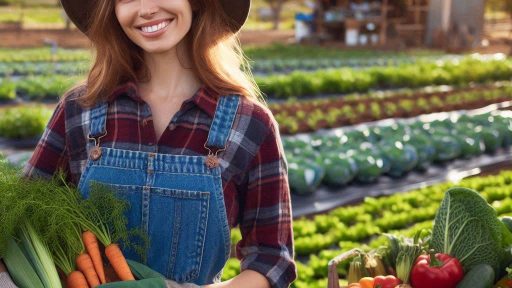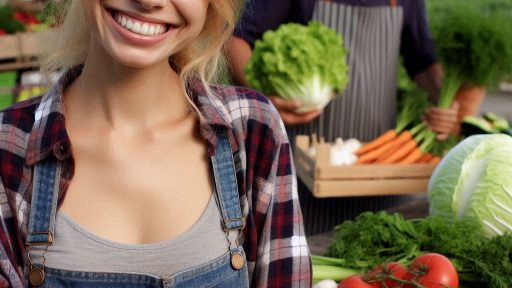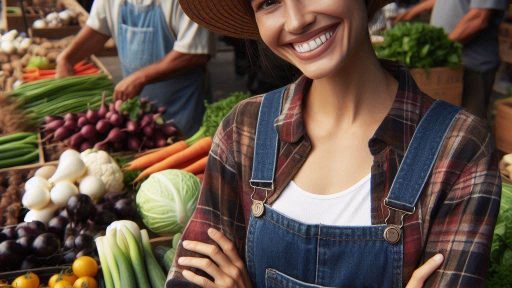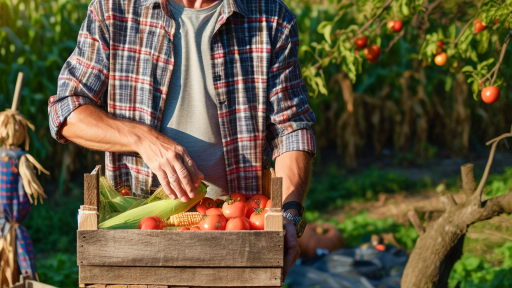Introduction
Welcome to Sarah’s Farm-to-Table Dream, where sustainable food production meets passion.
Sarah, an organic farmer, embodies this ethos. This blog section delves into Sarah’s journey, highlighting her commitment to organic farming and sustainable practices.
You’ll witness the challenges she faces and the triumphs she celebrates as she brings fresh, organic produce from her farm to your table.
Join us as we follow Sarah’s inspiring path towards a more sustainable future in food production.
Through her story, we’ll explore the importance of supporting local farmers and the benefits of consuming organic, locally sourced foods.
Get ready to be inspired by Sarah’s dedication to creating a healthier and more environmentally conscious food system.
Background on Sarah
- Sarah grew up in a small town, surrounded by nature and a deep appreciation for agriculture.
- After high school, Sarah attended an agricultural college where she studied farming techniques and sustainable practices.
- During her time in college, Sarah worked on various organic farms, gaining valuable hands-on experience.
- Upon graduating, Sarah was determined to start her own organic farm and share her passion for sustainable agriculture with others.
Her motivation to pursue organic farming and the values she holds dear
- Sarah’s love for the environment and desire to preserve it played a major role in her decision to pursue organic farming.
- She firmly believes in the importance of avoiding harmful pesticides and chemicals that can damage both the land and consumer’s health.
- For Sarah, organic farming is a way to connect with nature, nurture the soil, and produce food that is truly nourishing.
- She is driven by a sense of responsibility towards future generations, wanting to leave behind a healthier and more sustainable world.
- Sarah’s values revolve around community, as she is dedicated to supporting local economies and providing access to fresh, organic produce to her neighbors.
- She actively participates in farmers’ markets and partners with local restaurants to bring her farm-to-table products to a wider audience.
- Sarah believes in transparency and educates her customers about the importance of knowing where their food comes from.
- She encourages them to visit her farm and witness firsthand the care and effort that goes into every organic crop she cultivates.
- In her eyes, organic farming is not just a career, but a way of life that fosters a deeper connection with the earth and the food we consume.
- Sarah’s dream is to inspire others to join the organic farming movement and experience the joy and fulfillment it brings.
Sarah’s journey into farming is a testament to following one’s passion and dedicating oneself to a cause that aligns with personal values.
Her organic farm stands as a shining example of what can be achieved when a commitment to sustainability and community is at the heart of every decision.
Through her farm-to-table dream, Sarah is not only nourishing bodies but also nurturing a brighter and more sustainable future for all.
Read: Family Farm Life: The Smiths’ Tale
Sarah’s Farming Practices
In her farm-to-table operation, Sarah employs various organic farming practices and methods to ensure the production of healthy and sustainable food.
One of Sarah’s key commitments is to using natural pesticides and fertilizers.
Instead of relying on synthetic chemicals, Sarah prefers organic alternatives such as insecticidal soap, neem oil, and compost.
These natural solutions not only protect her crops but also minimize the negative impact on the environment.
Furthermore, Sarah is strongly against using genetically modified organisms (GMOs) in her farming practices.
She believes that the long-term effects of GMOs on human health and the environment are still unknown.
Instead, she focuses on preserving the diversity of heirloom and heritage varieties, which not only provides unique flavors but also safeguards our food system.
Another aspect of Sarah’s organic farming practices is her use of sustainable irrigation techniques.
Rather than wasting water through traditional irrigation methods, Sarah employs drip irrigation systems and rainwater harvesting.
These techniques help conserve water resources and minimize the farm’s environmental footprint.
Additionally, Sarah practices crop rotation and companion planting to naturally control pests and diseases.
By alternating different crops in her fields, she disrupts the life cycles of pests, reducing their populations.
Sarah also strategically plants certain plants together to attract beneficial insects or repel harmful ones, creating a balanced ecosystem without the need for synthetic pesticides.
Composting plays a vital role in Sarah’s farming operations. She creates her own compost from organic waste, such as vegetable scraps, leaves, and animal manure.
This rich compost adds valuable nutrients back into the soil, improving its fertility and structure, while reducing the reliance on chemical fertilizers.
Sarah’s commitment to sustainability
As part of her commitment to sustainability, Sarah also practices responsible land management.
She avoids soil erosion by using cover crops, mulching, and contour plowing techniques.
These methods help retain moisture in the soil, prevent nutrient runoff, and maintain soil health for future generations.
In addition to her farming practices, Sarah actively engages with her local community and educates people about the benefits of organic farming.
She opens her farm to visitors, giving them an opportunity to witness her sustainable practices firsthand.
Sarah also conducts workshops and training sessions to inspire and empower others to embrace organic farming methods.
In fact, Sarah’s farm-to-table dream is realized through her dedication to organic farming practices.
From utilizing natural pesticides and fertilizers to avoiding GMOs and employing sustainable irrigation techniques, Sarah creates a thriving and sustainable ecosystem on her farm.
Through her efforts, she not only produces healthy and flavorful food but also inspires others to adopt organic practices for a better future.
Read: Farm Innovations: Alex’s High-Tech Field
Transform Your Agribusiness
Unlock your farm's potential with expert advice tailored to your needs. Get actionable steps that drive real results.
Get Started
The Importance of Organic Farming
Organic farming is gaining popularity due to its numerous benefits and advantages for both consumers and the environment.
By choosing organically grown produce, individuals can enjoy improved health benefits and reduced exposure to harmful chemicals.
Benefits of Organic Farming
- Environmental Conservation: Organic farming practices focus on maintaining soil health, biodiversity, and natural ecosystems, promoting sustainability.
- No Chemical Residues: Organic farming avoids the use of synthetic pesticides, herbicides, and fertilizers, ensuring that produce is free from harmful chemical residues that can accumulate in the body.
- Enhanced Soil Fertility: Organic farming methods prioritize composting, crop rotation, and natural fertilizers, which nourish the soil, improving its fertility and long-term productivity.
- Water Conservation: Organic farming minimizes water pollution by using conservation techniques, such as efficient irrigation and preventing chemical runoff into water sources.
- Preserving Biodiversity: Organic farms support diverse plant and animal species, as they avoid genetically modified organisms (GMOs) and promote natural pollination methods.
Health Benefits of Consuming Organic Produce
- Nutritional Value: Organic fruits and vegetables are generally richer in essential nutrients, vitamins, and minerals, contributing to a healthier diet.
- No GMOs: Organic farming prohibits genetically modified crops, reducing the consumption of potentially harmful, genetically altered foods.
- Pesticide-Free: By choosing organic produce, individuals limit their exposure to toxic pesticides, which have been linked to various health issues.
- Reduced Food Allergies: Organic farming minimizes the use of allergenic substances, reducing the risk of triggering allergic reactions in sensitive individuals.
- Taste and Flavor: Organic produce is often described as having better taste and flavor due to the absence of synthetic additives and chemicals.
Furthermore, organic farming practices have a positive impact on the environment, contributing to long-term sustainability and biodiversity preservation.
By supporting organic farming, consumers are actively participating in the conservation of natural resources, reducing pollution, and promoting healthier ecosystems.
It is important to note that while organic farming offers numerous benefits, it may also come with some challenges.
Organic produce can be more expensive compared to conventionally grown alternatives, as organic farmers often face higher production costs.
Additionally, organic farming requires knowledge and commitment, as farmers need to implement specific practices to meet organic certification standards.
Despite these challenges, the advantages of organic farming for both consumers and the environment make it a compelling choice.
By opting for organic produce, individuals contribute to their own well-being while supporting sustainable agriculture practices that protect the planet for future generations.
Read: The Local Food Hero: Emily’s Story
Sarah’s Impact on the Community
Sarah, a passionate advocate for sustainable farming, has been deeply involved in promoting sustainable farming practices within her local community.
- Sarah organizes workshops and seminars, educating the community about sustainable farming.
- She collaborates with local farmers, promoting organic methods and providing support.
- Sarah establishes a farmer’s market, featuring exclusively organic produce.
- Spearheading a community garden, she promotes sustainable farming and strengthens community bonds.
- Initiating school programs, Sarah educates students about organic farming benefits.
- Actively engaging in public campaigns, she raises awareness about harmful farming practices.
- Sarah organizes farm tours, offering firsthand experiences to community members.
- She plays a pivotal role in establishing a CSA program.
- Working with restaurants and businesses, Sarah encourages local farm sourcing.
- Engaging in policy advocacy, she promotes sustainable farming policies.
- Sarah partners with food banks, reducing food waste by distributing excess produce.
- She organizes regular community events, fostering appreciation for local, organic food.
In short, Sarah’s unwavering dedication and initiatives have had a profound impact on the community.
Through education, collaboration, and advocacy, she has successfully promoted sustainable farming practices, educated consumers about the benefits of organic farming, and supported local farmers.
Sarah’s farm-to-table dream has transformed the community’s approach to food, fostering a healthier and more sustainable future.
Read: Farm-to-Fork: Jane’s Organic Practices
Challenges and Rewards
Challenges that Sarah Faces as an Organic Farmer
Becoming an organic hero hasn’t been an easy journey for Sarah.
Despite the numerous challenges she faces as an organic farmer, such as unpredictable weather conditions and stiff competition, the rewards she experiences make it all worth it.
Weather conditions are a constant cause of concern for Sarah.
One year, an unexpected frost threatened to destroy her entire crop. With sleepless nights and intense effort, she managed to salvage most of her plants.
However, it was a reminder that nature is unpredictable, and a farmer’s work is always at the mercy of the elements.
Competition is another hurdle Sarah must overcome.
While her organic produce is highly sought after by health-conscious consumers, established farms with more significant resources can offer lower prices.
Sarah often finds herself strategically pricing her products, ensuring that she can maintain a reasonable margin while still attracting customers.
Rewards that Sarah Experiences
Despite these challenges, the rewards Sarah experiences as an organic farmer are abundant.
Sarah’s primary motivation is the satisfaction of providing healthy, organic food to her community.
When she sees families picking up fresh produce from her farm, she knows she is making a positive impact on their lives.
Being an organic farmer means being part of a sustainable movement.
Sarah takes pride in knowing that she is contributing to a healthier future by reducing the use of harmful chemicals and practicing environmentally friendly farming methods.
She believes that small-scale organic farming can play a significant role in promoting ecological balance.
One of the most rewarding aspects of Sarah’s farm-to-table dream is the close connection she has with her customers.
Unlike supermarket produce, Sarah knows exactly who is consuming her fruits and vegetables.
She cherishes the conversations with her customers, sharing tips and recipes while witnessing their appreciation for her hard work.
While Sarah faces numerous challenges as an organic farmer, the rewards she gains from her work far outweigh the difficulties.
The satisfaction of providing healthy food, being part of a sustainable movement, and connecting with her community make Sarah’s farm-to-table dream a true success.
Conclusion
Sarah’s journey from dreamer to organic farming pioneer has had a profound impact on the community.
Her determination, passion, and unwavering commitment to sustainable practices have inspired countless individuals to embrace the farm-to-table movement.
Through her hard work and dedication, Sarah has transformed her farm into an oasis of organic goodness.
She has not only cultivated a variety of vibrant and nutritious crops but also created a space that fosters education and community engagement.
Sarah’s farm-to-table approach has made a significant impact on the local organic farming community.
Farmers are now adopting her practices, recognizing the value of sustainable agriculture and the role it plays in preserving our planet’s health.
Sarah has proven that organic farming is not only environmentally friendly but also economically viable.
By supporting local organic farmers, we can contribute to a healthier future for ourselves and generations to come.
Consuming organic produce ensures that we are consuming food that is free from harmful pesticides, hormones, and genetically modified organisms.
It’s a choice that not only benefits our health but also supports local economies.
Sarah, our organic hero, serves as an inspiration to us all.
Her relentless pursuit of a sustainable future, combined with her commitment to providing nourishing food, is a reminder of the power of one person’s actions.
Let us follow her lead, support local organic farmers, and strive towards a healthier, greener world.
Together, we can make a difference.




